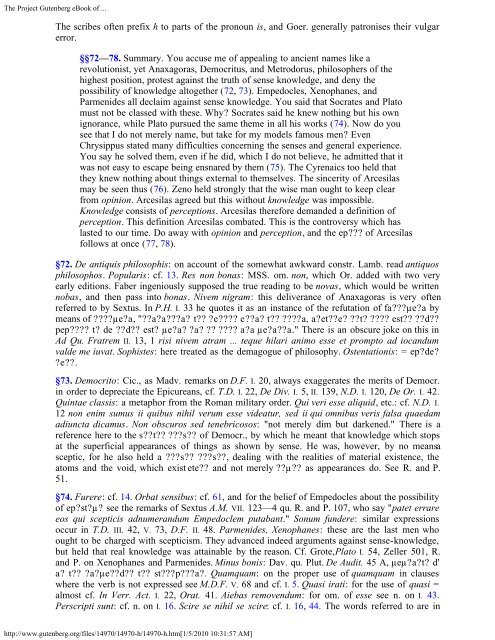academica of cicero. - 912 Freedom Library
academica of cicero. - 912 Freedom Library
academica of cicero. - 912 Freedom Library
Create successful ePaper yourself
Turn your PDF publications into a flip-book with our unique Google optimized e-Paper software.
The Project Gutenberg eBook <strong>of</strong> ...<br />
The scribes <strong>of</strong>ten prefix h to parts <strong>of</strong> the pronoun is, and Goer. generally patronises their vulgar<br />
error.<br />
§§72—78. Summary. You accuse me <strong>of</strong> appealing to ancient names like a<br />
revolutionist, yet Anaxagoras, Democritus, and Metrodorus, philosophers <strong>of</strong> the<br />
highest position, protest against the truth <strong>of</strong> sense knowledge, and deny the<br />
possibility <strong>of</strong> knowledge altogether (72, 73). Empedocles, Xenophanes, and<br />
Parmenides all declaim against sense knowledge. You said that Socrates and Plato<br />
must not be classed with these. Why? Socrates said he knew nothing but his own<br />
ignorance, while Plato pursued the same theme in all his works (74). Now do you<br />
see that I do not merely name, but take for my models famous men? Even<br />
Chrysippus stated many difficulties concerning the senses and general experience.<br />
You say he solved them, even if he did, which I do not believe, he admitted that it<br />
was not easy to escape being ensnared by them (75). The Cyrenaics too held that<br />
they knew nothing about things external to themselves. The sincerity <strong>of</strong> Arcesilas<br />
may be seen thus (76). Zeno held strongly that the wise man ought to keep clear<br />
from opinion. Arcesilas agreed but this without knowledge was impossible.<br />
Knowledge consists <strong>of</strong> perceptions. Arcesilas therefore demanded a definition <strong>of</strong><br />
perception. This definition Arcesilas combated. This is the controversy which has<br />
lasted to our time. Do away with opinion and perception, and the ep??? <strong>of</strong> Arcesilas<br />
follows at once (77, 78).<br />
§72. De antiquis philosophis: on account <strong>of</strong> the somewhat awkward constr. Lamb. read antiquos<br />
philosophos. Popularis: cf. 13. Res non bonas: MSS. om. non, which Or. added with two very<br />
early editions. Faber ingeniously supposed the true reading to be novas, which would be written<br />
nobas, and then pass into bonas. Nivem nigram: this deliverance <strong>of</strong> Anaxagoras is very <strong>of</strong>ten<br />
referred to by Sextus. In P.H. I. 33 he quotes it as an instance <strong>of</strong> the refutation <strong>of</strong> fa???µe?a by<br />
means <strong>of</strong> ????µe?a, "??a?a???a? t?? ?e???? e??a? t?? ????a, a?et??e? ??t? ???? est?? ??d??<br />
pep???? t? de ??d?? est? µe?a? ?a? ?? ???? a?a µe?a??a." There is an obscure joke on this in<br />
Ad Qu. Fratrem II. 13, 1 risi nivem atram ... teque hilari animo esse et prompto ad iocandum<br />
valde me iuvat. Sophistes: here treated as the demagogue <strong>of</strong> philosophy. Ostentationis: = ep?de?<br />
?e??.<br />
§73. Democrito: Cic., as Madv. remarks on D.F. I. 20, always exaggerates the merits <strong>of</strong> Democr.<br />
in order to depreciate the Epicureans, cf. T.D. I. 22, De Div. I. 5, II. 139, N.D. I. 120, De Or. I. 42.<br />
Quintae classis: a metaphor from the Roman military order. Qui veri esse aliquid, etc.: cf. N.D. I.<br />
12 non enim sumus ii quibus nihil verum esse videatur, sed ii qui omnibus veris falsa quaedam<br />
adiuncta dicamus. Non obscuros sed tenebricosos: "not merely dim but darkened." There is a<br />
reference here to the s??t?? ???s?? <strong>of</strong> Democr., by which he meant that knowledge which stops<br />
at the superficial appearances <strong>of</strong> things as shown by sense. He was, however, by no means a<br />
sceptic, for he also held a ???s?? ???s??, dealing with the realities <strong>of</strong> material existence, the<br />
atoms and the void, which exist ete?? and not merely ??µ?? as appearances do. See R. and P.<br />
51.<br />
§74. Furere: cf. 14. Orbat sensibus: cf. 61, and for the belief <strong>of</strong> Empedocles about the possibility<br />
<strong>of</strong> ep?st?µ? see the remarks <strong>of</strong> Sextus A.M. VII. 123—4 qu. R. and P. 107, who say "patet errare<br />
eos qui scepticis adnumerandum Empedoclem putabant." Sonum fundere: similar expressions<br />
occur in T.D. III. 42, V. 73, D.F. II. 48. Parmenides, Xenophanes: these are the last men who<br />
ought to be charged with scepticism. They advanced indeed arguments against sense-knowledge,<br />
but held that real knowledge was attainable by the reason. Cf. Grote, Plato I. 54, Zeller 501, R.<br />
and P. on Xenophanes and Parmenides. Minus bonis: Dav. qu. Plut. De Audit. 45 A, µeµ?a?t? d'<br />
a? t?? ?a?µe??d?? t?? st???p???a?. Quamquam: on the proper use <strong>of</strong> quamquam in clauses<br />
where the verb is not expressed see M.D.F. V. 68 and cf. I. 5. Quasi irati: for the use <strong>of</strong> quasi =<br />
almost cf. In Verr. Act. I. 22, Orat. 41. Aiebas removendum: for om. <strong>of</strong> esse see n. on I. 43.<br />
Perscripti sunt: cf. n. on I. 16. Scire se nihil se scire: cf. I. 16, 44. The words referred to are in<br />
http://www.gutenberg.org/files/14970/14970-h/14970-h.htm[1/5/2010 10:31:57 AM]















